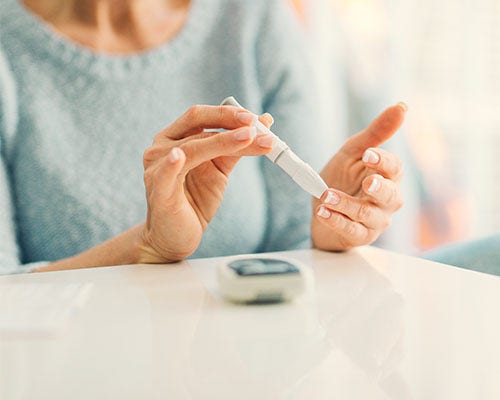The Sneaky Way Sugar Can Lead to Hormone Imbalance
- 3/14/18
by Ashley Grano
Hormones are the body’s chemical messengers, helping to control nearly every physiological process in the body. This includes metabolism, immune functioning, the menstrual cycle, and overall reproductive health, according to Healthline. Therefore, there is a high likelihood that imbalanced hormones might be the underlying cause of many different health conditions.
Maintaining balanced hormones is complex, as many different factors can contribute to fluctuating hormone levels, especially in women. Throughout the various different stages of life, from puberty to pregnancy to menopause, hormones are naturally in flux. For many of the years in between, however, hormones may flux and become imbalanced as a result of lifestyle and environmental factors, such as high levels of stress, poor sleep, lack of exercise, and an unhealthy diet full of fat and sugar. While all factors are important to consider, monitoring sugar intake is especially key as it relates to women’s hormones.
The Trouble with Sugar
Most people tend to associate sugar as merely a precursor to weight gain, but its effects go way beyond the threat to the waistline. For women especially, a diet full of excessive sugar – which includes all refined carbohydrates, not just the sweet stuff – can lead to significant hormonal imbalance. One of the most notable effects of too much sugar is insulin resistance, according to the Cleveland Clinic.
Insulin is highly affected by diet because of the many different signals going on throughout the body as a result of the glucose, and resulting energy, that is produced from carbohydrate intake. Once insulin resistance develops, the muscles, fat, and liver cells don’t respond to it properly, leading to a chain reaction in the body, per Healthline. Over time, insulin resistance can lead to serious conditions like diabetes, obesity, high cholesterol, heart disease and even stroke.
Female-specific Health Issues
This insulin imbalance also extends to other women-specific conditions, such as polycystic ovary syndrome (PCOS), which is when reproductive hormones are imbalanced. Per WebMD, the symptoms of PCOS can be mild or worsen in time, and may include acne, weight gain and difficulty losing weight, excess hair on the face and body, irregular periods, fertility problems and depression. Insulin resistance is one of the main physiological imbalances in most, if not all, PCOS, as noted by experts at the Cleveland Clinic.
Therefore, a diet high in sugar can have significant effects on the reproductive hormones and can help explain the link between conditions such as PCOS. Sugar is intrinsically linked to estrogen, a hormone responsible for many processes in the body. Estrogen has many beneficial effects, including regulating the reproductive system as well as helping optimize the action of insulin, the hormone that prevents high blood sugar levels.
Even if PCOS is not an issue, signs of hormonal imbalance still present physical and emotional symptoms in women in other ways, such as sleep disorders, fatigue, difficulty concentrating, feeling irritable, moody, depressed, and more, according to WebMD.
How to Help Restore Balance in the Body
While it can seem overwhelming, simple blood tests can help address each woman’s specific hormonal imbalances. From there, a holistic treatment plan (with a strong emphasis on a balanced diet) can help resolve and correct hormonal imbalances that can stem from excessive sugar.
In the meantime, there’s no need to wait on getting started with a diet overhaul. Since high sugar intake along with a highly refined carb/processed food diet are the most common contributors to insulin resistance and hormonal imbalance, making changes to eat “clean” can greatly improve health overall. This includes eating a variety of organic vegetables and fruits, whole grains, low fat dairy products, and lean sources of protein such as fish, suggests Healthline. It is also important to limit caffeine and alcohol consumption, as these can cause cortisol hormones to spike (which can disrupt all other hormone levels).
After hormone levels have been tested, ask your doctor if plant foods that contain phytoestrogens, which are groups of chemicals that weakly act like estrogen in the body, are right for you. According to Healthline, Non-GMO Project Verified soy is a great dietary source of phytoestrogens, specifically isoflavones, which bind to estrogen receptors in the body. While there are some conflicting studies on isoflavones and soy, the American Journal of Clinical Nutrition reports substantial beneficial evidence that soy foods may help address many conditions. Flaxseed is another significant source of phytoestrogens, which can help promote hormone balance if taken correctly.
Hormones are the body’s chemical messengers, helping to control nearly every physiological process in the body. This includes metabolism, immune functioning, the menstrual cycle, and overall reproductive health, according to Healthline. Therefore, there is a high likelihood that imbalanced hormones might be the underlying cause of many different health conditions.
Maintaining balanced hormones is complex, as many different factors can contribute to fluctuating hormone levels, especially in women. Throughout the various different stages of life, from puberty to pregnancy to menopause, hormones are naturally in flux. For many of the years in between, however, hormones may flux and become imbalanced as a result of lifestyle and environmental factors, such as high levels of stress, poor sleep, lack of exercise, and an unhealthy diet full of fat and sugar. While all factors are important to consider, monitoring sugar intake is especially key as it relates to women’s hormones.
The trouble with sugar
Most people tend to associate sugar as merely a precursor to weight gain, but its effects go way beyond the threat to the waistline. For women especially, a diet full of excessive sugar – which includes all refined carbohydrates, not just the sweet stuff – can lead to significant hormonal imbalance. One of the most notable effects of too much sugar is insulin resistance, according to the Cleveland Clinic.
Insulin is highly affected by diet because of the many different signals going on throughout the body as a result of the glucose, and resulting energy, that is produced from carbohydrate intake. Once insulin resistance develops, the muscles, fat, and liver cells don’t respond to it properly, leading to a chain reaction in the body, per Healthline. Over time, insulin resistance can lead to serious conditions like diabetes, obesity, high cholesterol, heart disease and even stroke.
Female-specific health issues
This insulin imbalance also extends to other women-specific conditions, such as polycystic ovary syndrome (PCOS), which is when reproductive hormones are imbalanced. Per WebMD, the symptoms of PCOS can be mild or worsen in time, and may include acne, weight gain and difficulty losing weight, excess hair on the face and body, irregular periods, fertility problems and depression. Insulin resistance is one of the main physiological imbalances in most, if not all, PCOS, as noted by experts at the Cleveland Clinic.
Therefore, a diet high in sugar can have significant effects on the reproductive hormones and can help explain the link between conditions such as PCOS. Sugar is intrinsically linked to estrogen, a hormone responsible for many processes in the body. Estrogen has many beneficial effects, including regulating the reproductive system as well as helping optimize the action of insulin, the hormone that prevents high blood sugar levels.
Even if PCOS is not an issue, signs of hormonal imbalance still present physical and emotional symptoms in women in other ways, such as sleep disorders, fatigue, difficulty concentrating, feeling irritable, moody, depressed, and more, according to WebMD.
How to help restore balance in the body
While it can seem overwhelming, simple blood tests can help address each woman’s specific hormonal imbalances. From there, a holistic treatment plan (with a strong emphasis on a balanced diet) can help resolve and correct hormonal imbalances that can stem from excessive sugar.
In the meantime, there’s no need to wait on getting started with a diet overhaul. Since high sugar intake along with a highly refined carb/processed food diet are the most common contributors to insulin resistance and hormonal imbalance, making changes to eat “clean” can greatly improve health overall. This includes eating a variety of organic vegetables and fruits, whole grains, low fat dairy products, and lean sources of protein such as fish, suggests Healthline. It is also important to limit caffeine and alcohol consumption, as these can cause cortisol hormones to spike (which can disrupt all other hormone levels).
After hormone levels have been tested, ask your doctor if plant foods that contain phytoestrogens, which are groups of chemicals that weakly act like estrogen in the body, are right for you. According to Healthline, Non-GMO Project Verified soy is a great dietary source of phytoestrogens, specifically isoflavones, which bind to estrogen receptors in the body. While there are some conflicting studies on isoflavones and soy, the American Journal of Clinical Nutrition reports substantial beneficial evidence that soy foods may help address many conditions. Flaxseed is another significant source of phytoestrogens, which can help promote hormone balance if taken correctly.




